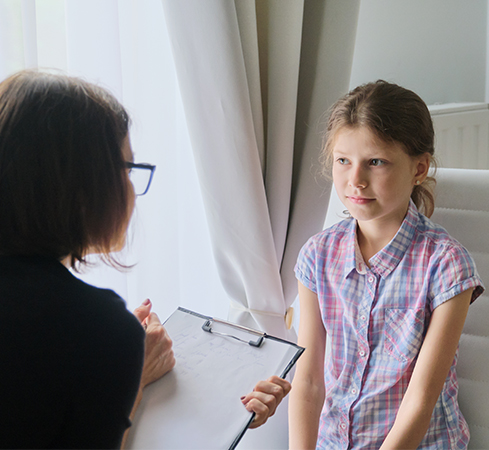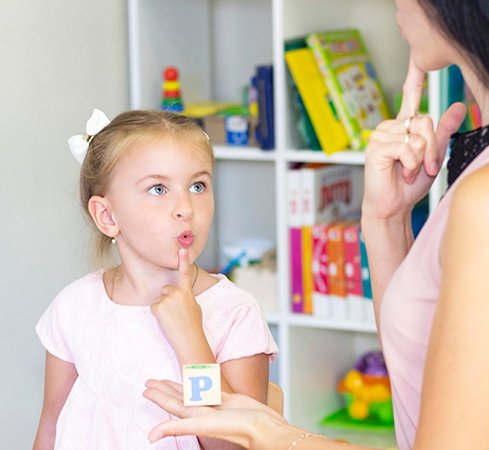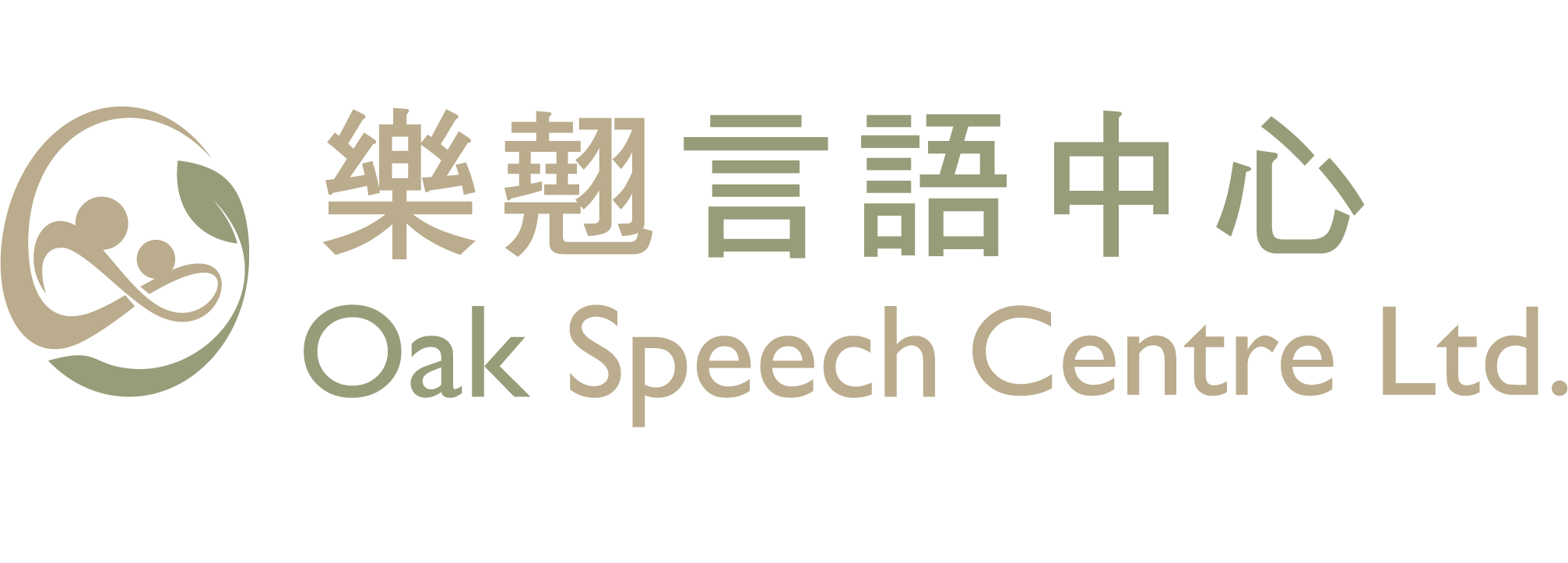

Speech and Language Therapy
According to the age, abilities and needs of clients, speech therapists use different assessment tools and methods to assess their language comprehension and expression, articulation, oral motor abilities, voice, speech fluency, social skills and so on. Individualized treatment plans will be developed according to the assessment results. During therapy, continuous assessment will be performed, and therapy goals will be modified accordingly.

Receptive and Expressive Language Training
- Speech therapists use various assessment tools to evaluate children’s language abilities. Individualized treatment plans will be developed according to a child’s abilities and needs.
- Speech therapists conduct training through interactive and play-based activities. Parental involvement is essential. We also provide training to parents so that therapy can be continued at home.
- Adult training of language comprehension and expression helps patients with acquired language impairments (Aphasia) due to neurological diseases (e.g. strokes), aging or other causes (e.g. brain injury) to improve their communication skills.
- Depending on the needs and abilities of an individual, our speech therapists use different approaches or methods to improve his/her language comprehension and expression e.g.
- Hanen Program®for children and parents of children with autism spectrum disorders
- It Takes Two to Talk®for children and parents of children with language delay
- The Picture Exchange Communication System (PECS)
- Communication books

You can refer to the following table; if your child presents one of these symptoms, it may indicate possible language delay/disorders. Feel free to consult our speech therapists for further information.
| Age | Symptoms |
| 2 | Cannot understand yes-no questions
Cannot follow simple commands (e.g. fly kiss, sit down) Cannot produce single words to express |
| 3 | Cannot understand “what”, “where”, “who” questions
Cannot follow commands (e.g. go to kitchen and take the cup) Cannot use short phrases to express (e.g. gives me ball, go to school) |
| 4 | Cannot understand “why” questions
Cannot express with sentences (We go to school by bus, Daddy takes a ball to me) Do not express with connectives (e.g. because, if) |
| 5-6 | Cannot understand simple stories
Cannot express with complex sentences (e.g. If it is cold, we wear a jacket) Cannot tell simple stories |
| School-aged (> 7) | Weak narrative skills, cannot report personal events
Lack vocabularies Difficult to follow school curriculum |
*As a reference only
Articulation Training
- Speech therapists design individualized treatment plans according to a person’s articulation abilities
- Speech therapists conduct training through interactive and play-based activities. Parental involvement is essential. We also provide training to parents so that therapy can be continued at home.
- Adult articulation training focuses on how to generalize articulation skills to everyday lives. Patients with apraxia of speech and dysarthria will be trained to improve their speech intelligibilities.
- Depending on the needs and abilities of an individual, our speech therapists use different approaches or methods to improve an individual’s articulation skills e.g.
- TalkTools® Oral Placement Therapy
- Beckman Oral Motor Assessment and Intervention
- PROMPT (Prompts for Restructuring Oral Muscular Phonetic Targets) Techniques
You can refer to the following table; if your child presents one of these symptoms, it may indicate possible articulation delay/disorders. Feel free to consult our speech therapists for further information.
| Age | Symptoms |
| 2 | Can only produce a few sounds |
| 3 | Speech is very unclear. Even parents find the speech difficult to understand |
| 4 | Articulation errors. Speech is not clear. Strangers find the speech difficult to understand |
| 5 or above | Articulation errors are still observed |
*As a reference only

Voice Therapy
- There are numerous causes of dysphonia, including inflammation (laryngitis, laryngopharyngeal reflux), vocal nodules/polyps, voice misuse and overuse, etc
- If you have a voice disorder, you may feel tired and tense with your larynx. Your voice may sound:
- harsh or hoarse
- too loud or too soft, or you may ‘lose’ you voice entirely
- too high or too low-pitched
- Speech therapists conduct detailed assessments to look for underlying causes, and help an individual to understand how to use his/her voice properly.
- Depending on the needs and abilities of an individual, our speech therapists use different approaches or methods to improve his/her voice quality e.g.
- Voice Therapy Spectrum (VTS) for adults, adolescents & school-aged children
- Estill Voice Training
- Abdominal Breathing
- Sighing and Humming
- Manual Therapy

Speech Fluency Training
- It is normal for children to go through periods of stuttering when they are developing their languages. However, stuttering that persists for more than 3 months may require speech therapy to improve the fluency of speech
- Symptoms of stuttering may include difficulties in starting a word, phrase or sentence, prolonging a word or a sound within a word, repetition of a sound, syllable or word, or pauses within a word or between phrases. Stuttering may also be accompanied by some secondary behaviors, e.g. rapid eye blinks, tremors of the lips or jaw, or other unrelated body movements. If stuttering persists, it may affect a person’s psychosocial status.
- Speech therapists deliver individualized treatments according to an individual’s abilities. Parental involvement is essential. We also provide training to parents so that therapy can be continued at home.
- Adult fluency of speech training focuses on how to generalize the skills to daily and occupational conversations.
- Depending on the needs and abilities of an individual, our speech therapists use different approaches or methods to improve his/her fluency of speech e.g.
- Lidcombe Program for childhood stuttering
- Camperdown Program for stuttering in adults and adolescents

Oral Motor Training
- An oral motor disorder is characterized by difficulty controlling the lips, tongue and jaw during feeding and/or speaking
- If you have the following symptoms, consult speech therapists toassess for possible oral motor disorders:
- Drooling
- Difficult to be understood
- Robotic sounding speech
- Difficulty in imitating words
- Groping with the tongue, lips, or jaw when attempting to speak
- Feeding/eating difficulties
- Speech therapists assess an individual’s oromotor functions and deliver treatments on their oromotor functions and/or muscle coordination
- Depending on the needs and abilities of an individual, our speech therapists use different approaches or methods to improve his/heroromotor functions and/or coordinationg.
- TalkTools® Oral Placement Therapy
- TalkTools®Oral Placement Therapy
- Beckman Oral Motor Therapy Beckman Oral Motor Assessment and Intervention
- TalkTools® Oral Placement Therapy

Social Skills Training
- People with social communication issues tend to have difficulties in their communication with others, which may affect their development of friendship, abilities to adapt to new environments, etc.
- Our speech therapists can observe and assess an individual’s social communication abilities to identify his/her strengths and difficulties. Together with the information provided by parents, teachers and other professionals involved, a plan which is individualized to his/her abilities and needs will be designed.
- Depending on the needs and abilities of an individual, our speech therapists use different approaches or methods to improve his/her social skills e.g.
- Program for the Education and Enrichment of Relational Skills (PEERS®) for adolescents and young adults
- Social Stories

